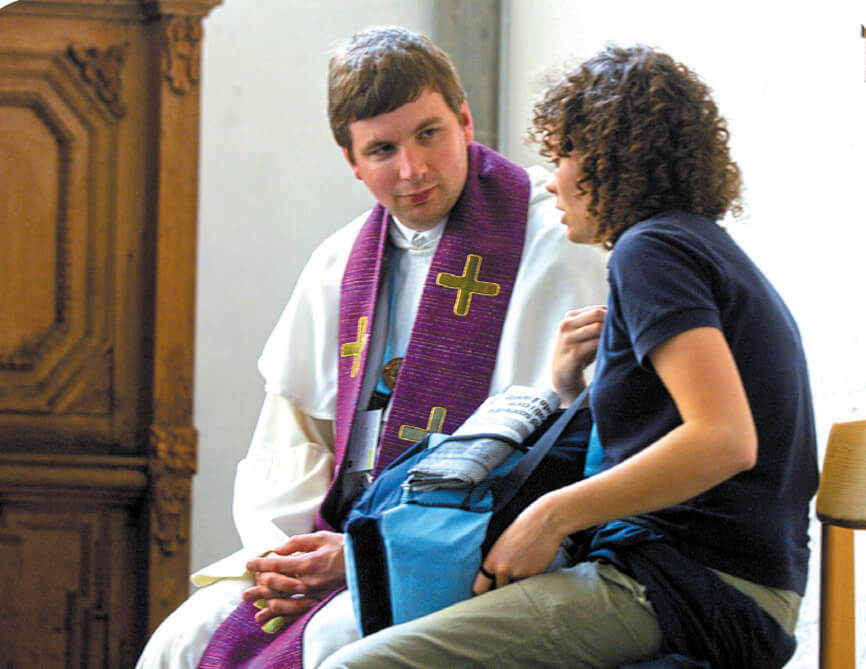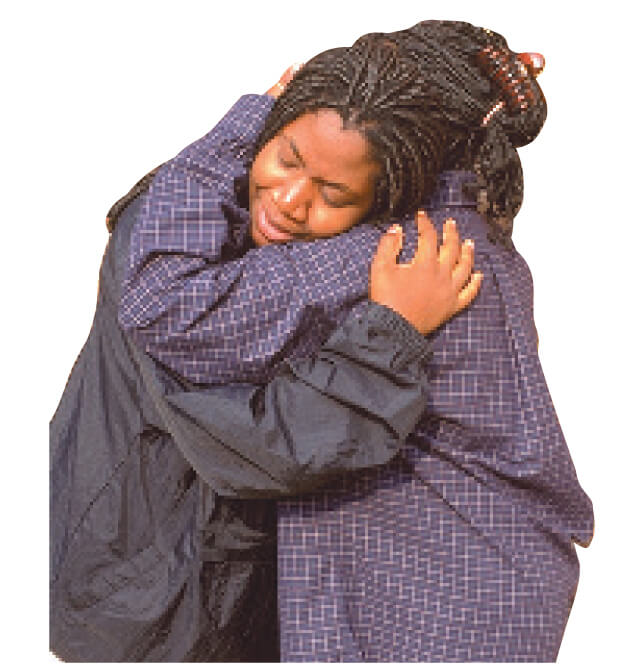
Forgiving the good thief is Jesus’ last act before he dies on the cross, his signature action that shows who he is. Restoring relationships continues to be part of the Church’s work at Mass and in the sacrament of reconciliation.
Every eucharist contains dialogues between God and the community of believers, who like the repentant thief know they need forgiveness.
In the Penitential Rite at the beginning of Mass, the community asks forgiveness, “I confess to Almighty God” or “Lord, have mercy.” The priest prays, “May almighty God have mercy on us, forgive us our sins, and bring us to life everlasting.” We all need forgiveness for the harm we do and the good we fail to do.
Every time we pray the Creed at Mass, we proclaim our faith in the forgiveness of sins.
The Eucharistic Prayer reminds us that Jesus gave his life so that sins may be forgiven.
When we pray the Our Father together at Mass, the prayer commits us to be forgiving like God; otherwise we limit God to being unforgiving to us.
After we pray the Our Father together before communion, the priest asks forgiveness for us, “Lord Jesus Christ, look not on our sins but on the faith of your Church and grant us the peace and unity of your kingdom.”
We learn to ask and give forgiveness usually in our closest relationships—in healthy families, among our friends. These are the people with whom we interact most, who matter most to us, and whom we are most likely to hurt or offend.
Saying I’m sorry is as important to learn as saying I love you. Saying I accept your apology is a way of starting over and restoring trust in a friendship. Really forgiving someone creates new energy and gives life in relationships.

In the sacrament of reconciliation we Catholics ask God’s forgiveness and work at keeping our relationships right. Human beings are free. We can make loving, life-giving decisions, but we can also mess up. We can make wrong, self-centered choices that hurt and harm others.
Sometimes we don’t see consequences or don’t want to see them. For example, one rides with a friend who has been drinking or believes gossip and drops a friend without checking out the rumor. A high school couple find themselves alone at one of their homes and have sex with a pregnancy the last result on their minds.
Sometimes teens live through painful family problems that are not their fault. Cold wars of silence between parents. Adultery. Divorces. Alcoholism. New relationships with stepparents. Some parents are much too strict and untrusting; some provide no rules at all.
Jesus challenges us to mutual love and service of one another—to love one another as he does, to be compassionate as God is, to love even our enemies. He models compassion in his attitude toward the repentant thief on the cross. The repentant thief models the desire to set his relationship with God right.
The sacrament of reconciliation invites us to deepen our response to Jesus’ call to be self-giving as he is. We express sorrow for ways we have failed in loving God and neighbor as he taught. The priest calls us to make amends—to pray, to read scripture, to talk to the person we hurt, to restore property, to take responsibility for harm we can’t undo. In reconciliation we seek to right our relationships with God and one another.
The Church’s prayer of absolution remembers that we live in God’s unfailing, forgiving love. God is the Father of mercies. Jesus, God’s Son, through his death and resurrection reconciles the world to himself and sends the Holy Spirit among us for the forgiveness of sins.
Individuals can seek forgiveness in this sacrament for serious sins. Parishes celebrate the sacrament of reconciliation as a community usually in Advent and Lent. To be Christian is to belong to a forgiving and reconciling people. Our love for one another reveals God’s presence in our world.
The sacrament of reconciliation restores us to God’s grace and friendship and restores and repairs relationships among us.
Catechism of the Catholic Church #1468-69, 1442-1460
